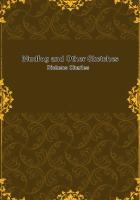Regular life does not exist for them. The whole life of the family hangs by a hair. What a terrible thing it is to suddenly receive the news that little Basile is vomiting, or that Lise has a cramp in the stomach! Immediately you abandon everything, you forget everything, everything becomes nothing. The essential thing is the doctor, the enema, the temperature. You cannot begin a conversation but little Pierre comes running in with an anxious air to ask if he may eat an apple, or what jacket he shall put on, or else it is the servant who enters with a screaming baby.
"Regular, steady family life does not exist. Where you live, and consequently what you do, depends upon the health of the little ones, the health of the little ones depends upon nobody, and, thanks to the doctors, who pretend to aid health, your entire life is disturbed. It is a perpetual peril. Scarcely do we believe ourselves out of it when a new danger comes: more attempts to save. Always the situation of sailors on a foundering vessel. Sometimes it seemed to me that this was done on purpose, that my wife feigned anxiety in order to conquer me, since that solved the question so simply for her benefit. It seemed to me that all that she did at those times was done for its effect upon me, but now I see that she herself, my wife, suffered and was tortured on account of the little ones, their health, and their diseases.
"A torture to both of us, but to her the children were also a means of forgetting herself, like an intoxication. I often noticed, when she was very sad, that she was relieved, when a child fell sick, at being able to take refuge in this intoxication. It was involuntary intoxication, because as yet there was nothing else. On every side we heard that Mrs.
So-and-so had lost children, that Dr. So-and-so had saved the child of Mrs. So-and-so, and that in a certain family all had moved from the house in which they were living, and thereby saved the little ones. And the doctors, with a serious air, confirmed this, sustaining my wife in her opinions. She was not prone to fear, but the doctor dropped some word, like corruption of the blood, scarlatina, or else--heaven help us--diphtheria, and off she went.
"It was impossible for it to be otherwise. Women in the old days had the belief that 'God has given, God has taken away,' that the soul of the little angel is going to heaven, and that it is better to die innocent than to die in sin. If the women of to-day had something like this faith, they could endure more peacefully the sickness of their children. But of all that there does not remain even a trace. And yet it is necessary to believe in something; consequently they stupidly believe in medicine, and not even in medicine, but in the doctor. One believes in X, another in Z, and, like all believers, they do not see the idiocy of their beliefs. They believe quia absurdum, because, in reality, if they did not believe in a stupid way, they would see the vanity of all that these brigands prescribe for them.
Scarlatina is a contagious disease; so, when one lives in a large city, half the family has to move away from its residence (we did it twice), and yet every man in the city is a centre through which pass innumerable diameters, carrying threads of all sorts of contagions. There is no obstacle: the baker, the tailor, the coachman, the laundresses.
"And I would undertake, for every man who moves on account of contagion, to find in his new dwelling-place another contagion similar, if not the same.
"But that is not all. Every one knows rich people who, after a case of diphtheria, destroy everything in their residences, and then fall sick in houses newly built and furnished. Every one knows, likewise, numbers of men who come in contact with sick people and do not get infected. Our anxieties are due to the people who circulate tall stories. One woman says that she has an excellent doctor. 'Pardon me,' answers the other, 'he killed such a one,' or such a one. And vice versa. Bring her another, who knows no more, who learned from the same books, who treats according to the same formulas, but who goes about in a carriage, and asks a hundred roubles a visit, and she will have faith in him.
"It all lies in the fact that our women are savages. They have no belief in God, but some of them believe in the evil eye, and the others in doctors who charge high fees. If they had faith they would know that scarlatina, diphtheria, etc., are not so terrible, since they cannot disturb that which man can and should love,--the soul. There can result from them only that which none of us can avoid,--disease and death. Without faith in God, they love only physically, and all their energy is concentrated upon the preservation of life, which cannot be preserved, and which the doctors promise the fools of both ***es to save. And from that time there is nothing to be done; the doctors must be summoned.
"Thus the presence of the children not only did not improve our relations as husband and wife, but, on the contrary, disunited us. The children became an additional cause of dispute, and the larger they grew, the more they became an instrument of struggle.
One would have said that we used them as weapons with which to combat each other. Each of us had his favorite. I made use of little Basile (the eldest), she of Lise. Further, when the children reached an age where their characters began to be defined, they became allies, which we drew each in his or her own direction. They suffered horribly from this, the poor things, but we, in our perpetual hubbub, were not clear-headed enough to think of them. The little girl was devoted to me, but the eldest boy, who resembled my wife, his favorite, often inspired me with dislike.














